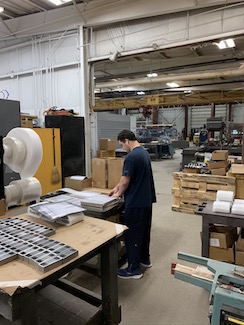Legislation Takes FMLA Into COVID-19 Context
The Families First Coronavirus Response Act (FFCRA) is designed to help companies with fewer than 500 employees navigate the pandemic. Like metal fabricators and manufacturers nationwide, this Michigan fabricating company is following federal and state guidance to keep employees safe while maintaining operations.
Posted: April 28, 2020
BY STEPHANIE JOHNSTON
Like many in the Fabricating & Metalworking community, Industrial Magnetics Inc. (IMI) feels compelled to mitigate the effects of the virus that killed 3,407 people as of April 27, 2020, in its home state of Michigan. To that end, the company is contributing all profits from sales of its recently developed hands-free door opener to local food pantries.
Michigan enacted some of the nation’s strictest pandemic response measures. But except for seven regional managers scattered throughout the country, IMI’s 80 employees have been coming in to work at its Boyne City facility.
None have tested positive for COVID-19, perhaps in part because of the company’s March 13 directive limiting business and personal travel, among other actions. A handful, according to Chief Business Development Officer Dennis O’Leary, have been on unemployment “under the expanded guidelines because they have school-age children and the state-mandated distance learning requires them to be home to assist in the education of their children.”
By “expanded guidelines,” O’Leary’s referring to the Families First Coronavirus Response Act (FFCRA), an extension of the Family and Medical Leave Act (FMLA) enacted on March 18, 2020. Consisting of the Emergency Paid Sick Leave Act (EPSLA) and Emergency Family and Medical Leave Expansion Act (EFMLEA), the law refines FMLA provisions for companies with 500 or fewer employees until Dec. 31, 2020.
For example, the EPSALA entitles full- and part-time employees are entitled to two weeks of paid sick leave (up to a certain amount per day) for six reasons, including seeking a COVID-19 diagnosis or recovering from the illness, without having to first use existing sick days. The EFMLEA provides up to 12 weeks of leave (first two unpaid, next 10 at two-thirds regular pay) to care for a child whose school or daycare is closed. Click here for details on both.
In return for the inevitable loss of productivity, employers are fully reimbursed for paid leave as well as health insurance costs via tax credits (up to a certain amount per day).
Companies with fewer than 50 employees may apply for an FFCRA exemption if the requirements would “jeopardize the viability of the business as a going concern.” Click here to find out what qualifies as a “small business.”
We’re by no means human resources experts, so click here for FFCRA employee rights postings in multiple languages, an FAQ, webinar slide show, and multiple other resources.
And stay safe.


















